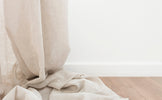STORAGEWORKS - March 31, 2023
Storage Material Comparison: Pros, Cons, and Considerations for Common Fabrics

Use trapezoidal fabric storage bins on the side table shelves at the entryway
When purchasing items online, you may not have the opportunity to touch the product and assess its quality. This is also true when buying fabric-covered storage solutions. To help you make a good choice, it is advisable to learn about the various types of fabric and their properties. By doing so, you can establish reasonable expectations and make an informed purchasing decision. To facilitate this, we have compiled a comparison of common fabric materials for your reference.
Polyester
Polyester is a type of synthetic fabric composed of resin. It is a lightweight option and feels smoother and silkier than cotton. This versatile material is commonly used in sports clothing, bedding, blankets, and furniture.
- Pros
All these hanging organizers feature strong boards to support the weight of your belongings safely and to keep the shelves from losing shape. They also have useful side pockets to hold your smaller items while giving you easy access to the contents. The elegant, minimalist style means they can be employed openly, and they will blend into your decor with ease. Ideal for storing sweaters, shirts, knitwear, pants, handbags, shoes, hats, socks, ties, etc. Also, they are all collapsible, meaning that they can be easily stored when not in use.
Polyester is an affordable fabric that offers excellent value for money. It is highly durable, reducing wear and tear and minimizing the need for replacement. This fabric is wrinkle-resistant, ensuring a clean and fresh appearance for extended periods and outlasting other fabrics. It is easy to maintain and clean and retains its color well over time.
To support sustainability, we use recycled polyester that repurposes pre-loved materials, keeping plastics out of landfills. It is perfect for "busy" living environments like households with pets, children, or multiple family members.
- Cons
Some manufacturers fail to incorporate recycled materials in their production process, which can decrease the fabric's overall eco-friendliness. Furthermore, the fabric may develop pills or runs under extreme usage.

Cotton
Cotton is a natural fiber that is widely used in clothing and various household items, including curtains, bed sheets, and coffee filters. The texture of the fabric can be manipulated during manufacturing to achieve either a smooth or a rough feel.
- Pros
As a natural fiber, cotton production involves no microplastics. It is flexible, strong, non-allergenic, and can be dyed in any shade to complement your decor.
- Cons
Over time, colors on cotton may fade. It is also susceptible to wrinkling, which may require additional care. Moreover, some environmental concerns arise regarding cotton production.
Nylon
Nylon, a synthetic fabric similar to polyester, has a silk-like texture and is smooth to the touch. This versatile material is frequently utilized in workout apparel, tights, and other stretchy items, as well as in the production of carpets, ropes, and tents.
- Pros
Nylon fabric dries quickly as it doesn't absorb water. It's a very strong material and retains its original shape even when stressed. Nylon also resists mildew (thanks to its non-absorption) and static.
- Cons
Acid-dying processes could lead to color bleeding or fading, so nylon might not be the best material for long-term use. As a plastic-based fabric, it is susceptible to melting and is not the most environmentally friendly option available.

Jute
Jute is a natural fiber produced from the stem of the jute plant. This rope-like material is known for its strength and durability. It's lightweight, yet able to withstand wear and tear, making it a popular choice for creating a variety of products.
- Pros
Jute's softness may be unexpected given its rope-like look. It's highly durable and 100% biodegradable, and offers superior stain resistance at an affordable price compared to other fabrics.
- Cons
Jute's strength decreases when it gets wet, and prolonged exposure to direct sunlight can lead to color changes. Cleaning jute can be challenging, and its porous nature can cause it to retain moisture and odors.

STORAGEWORKS hanging closet organizer with mesh pocket
Mesh
Mesh is a lightweight and breathable fabric with small holes throughout the weave, commonly made from polyester, nylon, or cotton. Its open weave makes it versatile for various projects, including summer clothing and home storage solutions.
- Pros
Mesh fabric is stretchy yet sturdy, soft, and easy to care for. It dries quickly, making it a convenient choice for many.
- Cons
Mesh fabric requires special care compared to other fabrics. It cannot be ironed and may retain odors if not washed and dried properly.
Non-Woven Fabric
Non-woven fabric is a type of material produced by bonding fibers together without the use of weaving or knitting. This process creates a flexible and strong material that can be customized for various purposes, including home storage solutions.
- Pros
Non-woven fabric is a soft, non-toxic material. It's technically not even fabric! Its antibacterial properties make it ideal for hospital gowns and masks.
- Cons
Compared to woven fabrics, non-woven materials have lower strength and durability. They require gentle handwashing instead of machine washing.

Choosing the Right Material for Your Storage Solutions
At STORAGEWORKS, we understand that choosing the right material for your storage solutions is crucial to achieving an organized home. We hope that the above comparison of common fabric materials has provided you with valuable insights and considerations for your next purchase. By setting the right expectations and selecting the right fabric for your needs, you can ensure that your storage solutions will last and serve their purpose well. Thank you for considering STORAGEWORKS for your organizational needs.




